Staff
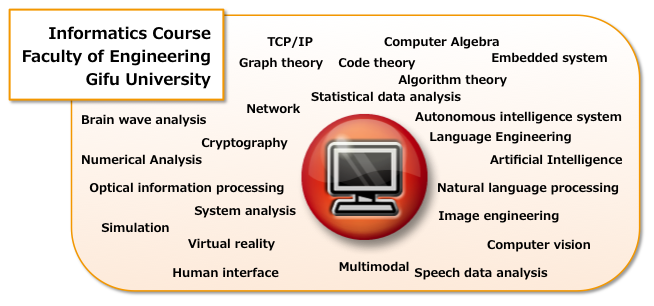
Faculty Members and Laboratories
| Title | Name | Office | E-mail* | Laboratory | Research Field |
| Professor | Kunihito Kato | E504 | kato.kunihito.k6@ | Kato Lab | Computer Vision, Image processing |
|
Associate Professor |
Yoshihiro Kaneko | E305 | kaneko.yoshihiro.r9@ | Kaneko Lab | Operations Research, Applied Graph Theory |
|
Associate Professor |
Alexander Carballo | E509 | carballo.segura.alexander.g1@ | Alexander Lab | automatic operation (machine),Autonomous Robot,Sensing |
| Professor | Hiroshi Kamabe | E407 | kamabe.hiroshi.m8@ | Kamabe-Lu Lab | Coding theory, Information theory, Multiple access communications |
| Professor | Tadashi Yamaguchi | F302 | yamaguchi.tadashi.z9@ | Yamaguchi Lab | Applied Numerical Analysis |
|
Associate Professor |
Ryugo Kijima | F307 | kijima.ryugo.n4@ | Kijima Lab | Human Interface, Virtual Reality |
| Professor | Keiichirou Kusakari | E404 | kusakari.keiichirou.y0@ | Kusakari Lab | Program Verification, Automatic Theorem Proving |
|
Associate Professor |
Yu Suzuki | E506 | suzuki.yu.r4@ | Suzuki Lab |
Large-scale real data processing, |
| Professor | Masahiro Tanaka | F401 | tanaka.masahiro.g1@ | Tanaka Lab | Optical Information Processing |
| Professor | Kazunori Terada | F304 | terada.kazunori.u8@ | Terada Lab | Autonomous Intelligence System |
|
Associate Professor |
Satoshi Tamura | C630 | tamura.satoshi.a2@ | Tamura Lab | Speech and Multimodal Data Analysis |
| Professor | Takeshi Hara |
Medical Department 8S23 |
hara.takeshi.p7@ | Hara-Zhou Lab | Medical Image Data Analysis |
|
Associate Professor |
Xiangrong Zhou |
Medical Department 8S21 |
zhou.xiangrong.n6@ | ||
|
Associate Professor |
Hidekazu Fukai | F403 | fukai.hidekazu.r3@ | Fukai Lab | Brain wave and MEG Data Analysis, Statistical Inverse Problem |
|
Associate Professor |
Tadahiro Matsumoto | E603 | matsumoto.tadahiro.m2@ | Matsumoto Lab | Language Engineering |
| Professor | Miwako Mishima | F409-1 | mishima.miwako.n0@ | Mishima Lab | Discrete Mathematics |
| Professor | Yasunari Yokota | E508 | yokota.yasunari.v2@ | Yokota-Shimizu Lab | System Analysis and Identification Engineering |
|
Assistant Professor |
Kosuke Shimizu | E303 | shimizu.kosuke.x5@ | ||
|
Associate Professor |
Xiao-Nan Lu | E401 | lu.xiaonan.b3@ | Lu Lab |
Combinatorics and Combinatorial Computing, Codes, Cryptography, Statistical Design of Experiments |
- Please add "f.gifu-u.ac.jp" for email address.
- Assistant Professor Keigo Imai retired in July 2023.
- Professor Fumihiko Saitoh retired in March 2023.
- Associate Professor Motoki Shiga moved to Tohoku University in March 2022.
- Associate Professor Michiko Harayama retired in March 2022.
- Associate Professor Masami Mohri moved to Kinki University in March 2022.
- Professor Satoru Hayamizu retired in March 2021.
- Professor Yoshihiro Kawase retired in March 2020.
- Professor Hiroshi Fujita retired in March 2018.
- Professor Masakazu Muro retired in March 2017.
- Professor Akira Ito retired in March 2015.
- Professor Kuniharu Kishida retired in March 2014.
- Professor Shoji Shinmura moved to the Applied Physics Course in April 2013.
- Professor Katsuo Tanaka retired in March 2013.
Research
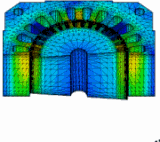 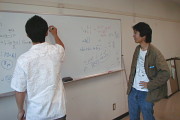 We conduct education and research in the following: 1) Information expressing and processing structure, and theory, 2) Algorithm & information processing method for the purpose of application, 3) Computer-support design based on algebraic geometry and numerical analysis using computer-aided calculation techniques, 4) Algorithms for intellectual image processing, utilizing statistical geometry and optimization technique, 5) Mathematical statistics, 6) Information theory, 7) Cording theory. We conduct education and research in the following: 1) Information expressing and processing structure, and theory, 2) Algorithm & information processing method for the purpose of application, 3) Computer-support design based on algebraic geometry and numerical analysis using computer-aided calculation techniques, 4) Algorithms for intellectual image processing, utilizing statistical geometry and optimization technique, 5) Mathematical statistics, 6) Information theory, 7) Cording theory. |
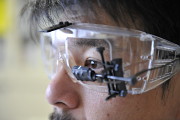 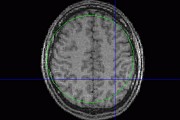 Information-related technologies such as optical fibers are used for the Internet. Information is displayed, transformed into electrical signals in the retina of the eyeballs, then transmitted to the central nervous system, and converted into letters or sentences in a way for humans to understand it. Advanced information processing is carried out within our brains during conversation. To establish the technique for obtaining, communicating, and processing information, we conduct education and research in optical information processing, statistical inverse problem, and biosignal processing. Information-related technologies such as optical fibers are used for the Internet. Information is displayed, transformed into electrical signals in the retina of the eyeballs, then transmitted to the central nervous system, and converted into letters or sentences in a way for humans to understand it. Advanced information processing is carried out within our brains during conversation. To establish the technique for obtaining, communicating, and processing information, we conduct education and research in optical information processing, statistical inverse problem, and biosignal processing. |
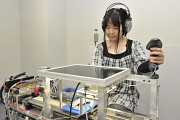 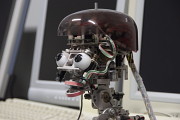 We deal with the research and development of computer systems which can make use of information as organic knowledge and think flexibly, as well as robots which can act autonomously. More specifically, the following research themes are being carried out: computer techniques for understanding natural language and translating it into other languages, sign languages, and braille; robots which can plan, act, and learn in certain environments; the mechanism of the human mind and communication between humans and machines by using the intelligent machines―the computers. We deal with the research and development of computer systems which can make use of information as organic knowledge and think flexibly, as well as robots which can act autonomously. More specifically, the following research themes are being carried out: computer techniques for understanding natural language and translating it into other languages, sign languages, and braille; robots which can plan, act, and learn in certain environments; the mechanism of the human mind and communication between humans and machines by using the intelligent machines―the computers. |
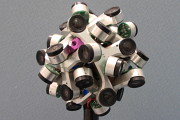 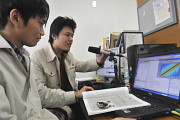 The following education and research applications are conducted through visual information (still and moving pictures) obtained from sight and sound information obtained from our sense of hearing: technique to recognize human living environment and to comprehend human intention, advanced human interface technique, application to medical care and medical industries through the use of virtual reality. technique to process chronological data and integrated multimodal processing; the algorithm theory; and the network theory The following education and research applications are conducted through visual information (still and moving pictures) obtained from sight and sound information obtained from our sense of hearing: technique to recognize human living environment and to comprehend human intention, advanced human interface technique, application to medical care and medical industries through the use of virtual reality. technique to process chronological data and integrated multimodal processing; the algorithm theory; and the network theory |




















